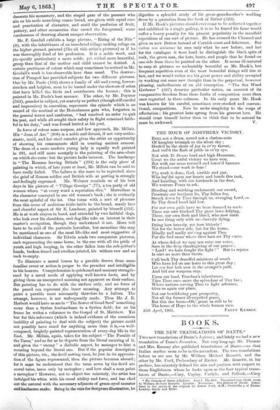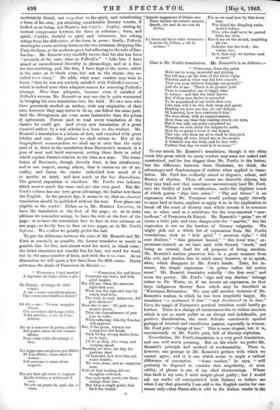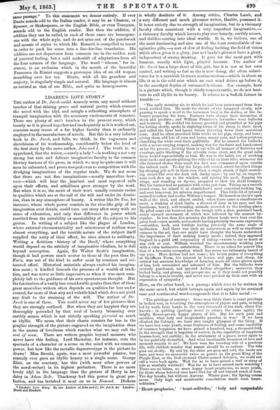BOOKS.
THE NEW TRANSLATIONS OF DANTE.* Two new translations of Dante's Inferno; and lately we had a new translation of Tasso's Jerusalem. Not very long ago Mr. Thomas and Mrs. Ramsay also published translations of Dante,—so that Italian studies seem to be in the ascendent. The two translations before us are one by Mr. William Michael Rossetti, and the other by Mr. Ford, Prebendary of Exeter. Mr. Rossetti, in his preface, has minutely defined his aim and position with respect to those Englishmen whom he looks upon as the four typical trans- lators of Dante,—Cary, Cayley, Carlyle, and Pollock,—Cary
• The Corned, of Dante AthlgAierl. Part I. The Hell. Translated into blank versa by William Michael Rossetti. London : Macmillan. The !Verso of Dante. Trans- lated in the metre of the original by James Ford, A.M., Prebendary of Exeter. London: Smith and Elder.
moderately literal, not very close to the spirit, and substituting a form of his own, yet attaining considerable literary results, if looked at as being, not Dante's, but Cary's ; Cayley, aiming by mutual compromise between the three at substanc., form, and spirit ; Carlyle, faithful to spirit and substance, but taking refuge from the difficulties of the form in prose ; finally, Pollock, steering his course midway between the two extremes, dropping like Cary the form, so far as rhyme goes, but adhering to the rule of line- for-line. Mr. Rossetti very candidly avows that his aim has been "precisely of the same class as Pollock's." "Like him I have aimed at unconditional literality in phraseology, and at a line- for-line rendering, and, like him, I have kept to the metre, which is the same as in blank verse, but not to the rhyme (the so- called terza rime)." He adds, what some readers may wish to know, "that he was not entirely satisfied with Pollock's success," which is indeed more than adequate reason for renewing Pollock's attempt. More than adequate, because even if satisfied of Pollock's success, Mr. Rossetti or any one else is quite warranted in bringing his own translation into the field. No two men who have genuinely studied an author, with any originality of their own, however they may strive to do so, can follow the same path. And the divergences are even more instructive than the points of agreement. Porson used to read every translation of the classics he could get. And every new translation of a great classical author by a real scholar is a boon to the student. Mr. Rossetti 's translation is a labour of love, and executed with great fidelity and care. His preface we shall return to. But of the biographical memorandum we shall say at once that the early part of it, down to the translation from Boccaccio's memoir, is a gem of neat and lucid statement, setting those facts in relief which explain Dante's relation to his time as a man. The trans- lation of Boccaccio, though cleverly done, is less satisfactory. and in one respect, among others, that it carries an air of un- reality, and leaves the reader undecided how much of it to ascribe to truth and how much to the lues Boswelliana. The general exposition is excellent. Mr. Ford's two indexes, which answer much the same end, are also very good. But Mr. Ford's volume has one very great advantage, the Italian text faces the English. In the present day, it seems to us, that no classical translation should be published without the text. Four plans are eligible to the reader. Either, as in Mr. Munro's Lucretius, to have the translation at the foot of the page ; or, as in some editions we remember seeing, to have the text at the foot of the page ; or to have the translation face to face in two columns on one page ; or finally face to face on two pages, as in Mr. Ford's Inferno. We confess we greatly prefer the last.
To put the difference between the aims of Mr. Rossetti and Mr. Ford as concisely as possible, the former translates as nearly as possible line for line, and almost word for word, in blank verse ; the latter translates not exactly line for line, nor word for word, but in the same number of lines, and with the terza rime. As an illustration we will quote a few lines from the fifth canto. Dante addresses the shade of Francesca da Rimini :—
"'Francesca, i tuoi martini A lagrimar mi fanno tristo e pio.
Na Dimmi : al tempo de' doki sospiri,
A che, e come concedette amore, Che conosceste i dubbioai desiri ? '
Ed ella a me : Nessun maggior dolore, Che ricordarsi del tempo felice Nella miseria ; e cin sa ii too dottore.
Ma' se a conoscer Is prima radice Del nostro amor tu hai cotanto affetto, Farb come colui che piange e dice.
Noi leggevamo un glom° per diletto Di Lancillotto, come amor lo • strinse Soli eravamo e senza alcun sospetto.
Per pin Hate gli oechi ci sespinse Quella lettura, e scolorocci ii vise: Na solo un punts in quel the ci 'rinse. " ' Francesca, thy sad throes Constrain my tears, and holy grief inspire.
But tell me when the amorous sighs me, rose, What was the sign and way by which fond love, The wish, to each unknown, did give disclose?'
Then she to me : No pain can greater prove, Than the remembrance of past joys to wake, When suffering: this thy Teacher will approve.
But, if the germ, whence our young love did break,
Such be thy strung desire from us to hear,
I'll do as they, who weep, and weeping speak.
Reading we were, one day, for pastime dear, Of Lancelot, how love him pri- soner bound ; We were alone, and no suspicion near.
Full oft that reading did our thoughts confound, Our eyes make meet, our faces change their hue ;
But 'twat; a single point, that fia'd the wound. That is Mr. Ford's translation. Mr. Rossetti's is as follows :— "Francesca, these thy pains
Make me to weep, mournful and pitying. But tell me,—at the time of the sweet sighs, Whereat and in what way did love concede That you your dubious longings recognized?' And sbe to me There is no greater grief Than to remember one of happy time In misery : and this thy tutor knows.
Bat if thou bast desire so powerful To be acquainted of our love's first root, Like him will I do who cloth weep and speak. Reading we were one day, for our delight, Of Lancelot, how love constrain'd him :
We were alone, with no suspiciousness.
More than one time that reading struck our eyes, But it was only one point conquered us.
Whenas we read about the longed-for smile, How by so great a lover it was kissed,
This one, who from me ne'er shall be disjoined,
Trembling all over, kissed me on the month.
A Galahalt was the book, and he that writ: Further that day we read in it no more."
To our minds Mr. Rossetti's translation, though it too often reads like prose which to many readers may seem too naked and constrained, and far less elegant than Mr. Ford's, is the better, but the difference between them illustrates, we think, the advantages and disadvantages of realism when applied to trans- lation. Mr. Ford has evidently aimed at elegance, colour, and fluency of rhythm. These of course are desirable objects, but they may lead, and they sometimes .unconsciously lead Mr. Ford, into the facility of hack versification, under the slightest touch of which genius "slips into ashes." "Thy sad throes" is an expression which Mr. Tennyson would perhaps apply cleverly to some bird or beast, anyhow so apply it as in the application to brush off the crust of literary cant which invests it in common use, or when used as a substitute for the ever-renewed " mar- tyrdoms " of Francesca da Rimini. Mr. Rossetti's " pains " are of course a little pale and even disagreaable for "martin," but the expression is not on the borders of literary vulgarity. We might pick out a whole list of expressions from Mr. Ford's translations, such as " holy grief," " amorous sighs," " did sure disclose," "him prisoner bound," " this lover true," ex- pressions crusted, as we have said, with literary "stock," and being so crusted, dead for all purposes of living emotion. Mr. Rossetti's realism preserves him in a great measure from this evil, and enables him to catch many beauties, so to speak, alive, which disappear in Mr. Ford's hands. Take, for in- stance, the simple expression "in prima raclice del nostro amor." Mr. Rossetti translates nakedly "the first root," and saves the poetry. Mr. Ford's 'sign and way disclose' belongs rather to Dr. Watts, or, if we invent an expression, to that large indigenous literary flora which may be described as Watteiana Britanniea.' We may add another instance of Mr. Rossetti's realism in which he has been singularly happy. He translates "e scolorocci viso " "and discoloured us in face." Even the magic of Tennyson's poetical intuition could hardly go further. There is a change of countenance due to violent emotion which is not so much pallor as an abrupt and indefinable, yet positive discoloration, the most delicate conceivable symbol perhaps of internal and tumultuous paision, especially in women. Mr. Ford puts "change of hue." This is more elegant, but it is, unconsciously on Mr. Ford's part, full of literary euphuism.
Nevertheless, Mr. Ford's translation is a very good translation, and one well worth perusing. But on the whole we prefer Mr. Rossetti's principle and method of workmanship. There is, however, one passage in Mr. Rossetti's preface with which we cannot agree, and it is one which seems to imply a radical difference of conception. "Some readers," he says, "will probably be disposed to consider that singularity, or even oddity, of phrase is one of my chief shortcomings. Where that fault is my own, I must simply plead guilty ; but I would ask my reader (if unacquainted with Italian) to believe me when I say that generally I am odd to the English reader for one reason only—that Dante also is odd to the Italian reader ill the
Quando leggemono II disiato rise Esser baciato da cotanto amante, Questi, dm mai da me non fia diviso,
La bocca ad back) tutto tremante : Galeotto In ii libro, e chi lo scrisse.' " For as we read how by this lover true
Was kiss'd the dimpling smile, desied before, This, who shall ne'er be parted from my view, Kiss'd me on the mouth, trembling all o'er.
Galeotto was the book : the writer, too: In it, that day, we further read no more.'"
same passage." To this statement we demur entirely. If ever Dante sounds odd to the Italian reader, it may be as Chaucer, or Spenser, or Shakespeare, or the English Bible, or even Tennyson, sounds odd to the English reader. But then the oddities, if oddities they can be called, in each of these cases are homogene- ous with the whole style, and do not arise out of the patchwork and mosaic of styles to which Mr. Rossetti is compelled to resort in order to pack his sense into a line-for-line translation. His oddities are not departures from common use in the sudden rush of poetical feeling, but a cold makeshift of adaptations from all the four corners of the language. The word " whenas," for in- stance, is an archaism which in the mouth of the beautiful Francesca da Rimini suggests a grotesque idea of an old we/Ilan mumbling over her tea. 'Dante, with all his grandeur and majesty, is singularly simple and natural. His language is almost as natural as that of our Bible, and quite as homogeneous.
































 Previous page
Previous page